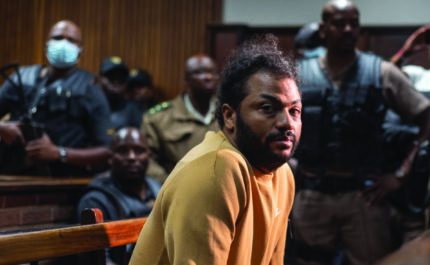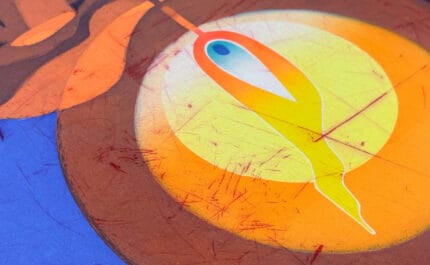Picking up the pieces
On 13th April the chief prosecutor of the International Criminal Court visited the recently liberated Kyiv suburb of Bucha and declared that there were “reasonable grounds” to believe war crimes had been committed during its occupation by Russian troops. Delayed Gratification investigates what happened in and around Bucha under the invaders – and how justice might be found for the victims
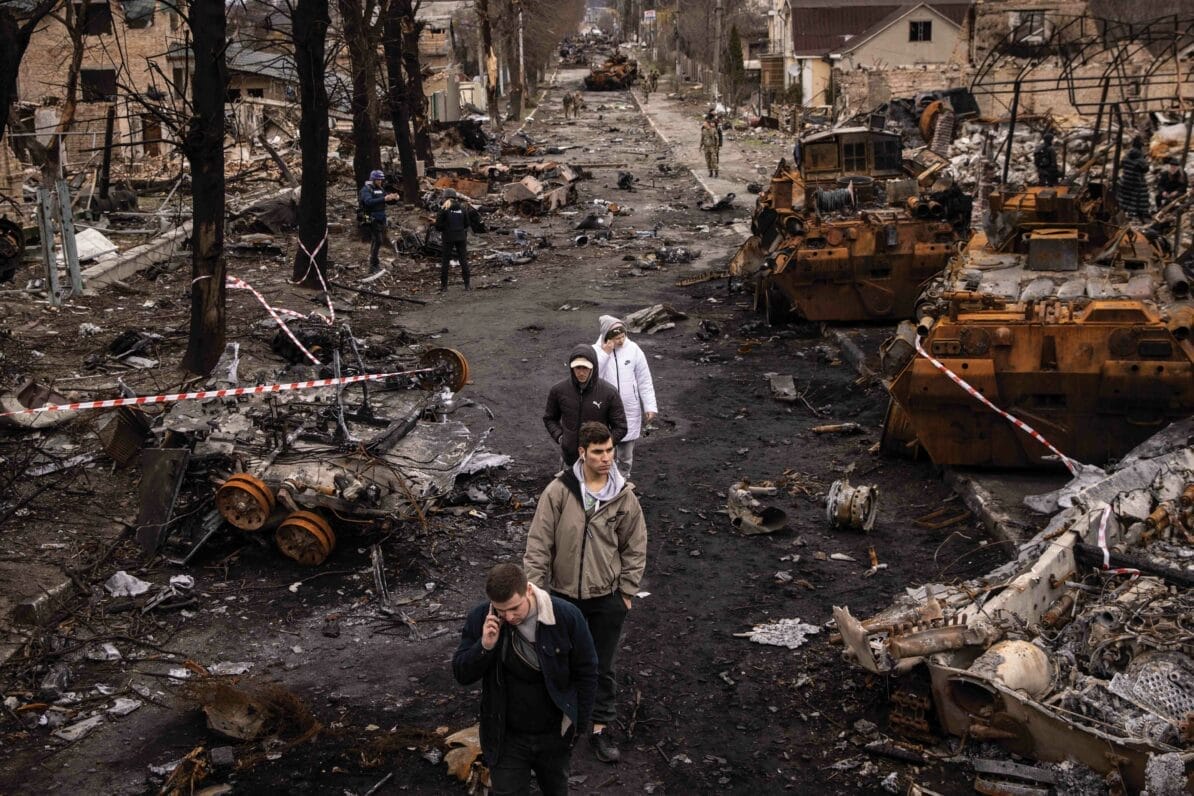
People walk through debris and destroyed Russian military vehicles on a street in Bucha, Ukraine, on 6th April 2022 in the aftermath of the Russian pull-out. Photo: Chris McGrath/Getty Images
13th April 2022 (Taken from: #47)
Karina Eroshova was just 15 when her family moved from Donetsk to Kyiv. It was 2014 and the Eroshova family were fleeing Russian-backed separatists who had seized control of the region where they lived. They had a comfortable life in Donetsk running a grocery store. They had a nice apartment, with family and friends nearby. But Karina’s mother, Olena Eroshova, was willing to leave it all behind for the sake of her only child’s future. “We didn’t want to live in some useless, unrecognised republic,” she tells me.
The Eroshova family worked hard to build a new life from scratch in Ukraine’s capital. Olena and her husband, Karina’s stepfather, found jobs and bought an apartment in Irpin, a small town on the outskirts of Kyiv. Over the years they watched Karina grow into a beautiful and accomplished young woman. Ready to spread her wings, but not wanting to be too far away, Karina rented a small apartment in Bucha, just a few miles from her parents’ place – close enough to visit them often and play with their two cats, whom she adored, but far enough to live her own life. It had seemed like their troubles were finally behind them. Karina had big dreams, recalls Olena. “She was planning on going abroad to work, she’d done that before… She wanted to go to university one day, but she didn’t have time [to] make it happen…”
Before the Russian invasion, Irpin and Bucha were thriving twin towns divided by a small river. In the Soviet era, the luscious sprawling pine forests that surrounded the towns made for an ideal location for children’s holiday camps and sanatoriums. In more recent years, Bucha and Irpin’s proximity to Kyiv had drawn in young families who wanted to live within an easy commute of the city but closer to nature. New apartment blocks boasted panoramic views over the forests. Chic coffee bars popped up to cater to the newcomers. For people like 23-year-old Karina, it was perfect. “She really liked living in this town,” Olena says.
I told her to come quickly because the war had begun. She said: ‘Mum what are you talking about?’”
All that changed on 24th February 2022. At around 5am, Russian soldiers streamed across the countries’ 1,300-mile shared border and, to the northwest, from Moscow ally Belarus. In a televised speech, Russian president Vladimir Putin announced that he had launched a ‘special military operation’ in Ukraine – a thinly veiled euphemism for a full-scale invasion. But what was planned to be a blitzkrieg manoeuvre to take Kyiv and topple Ukraine’s government quickly turned into a quagmire. Fierce resistance from Ukraine’s military and ad-hoc volunteer fighting battalions prevented Russian forces from entering the capital. A bid to seize Hostomel airport close to the capital, which would have enabled Moscow to resupply its troops by air, ended in failure. Unable to advance on Kyiv, Russian soldiers instead holed up in Irpin, Bucha and the surrounding towns and villages that lay between the border and Kyiv’s northern outskirts. The occupation of this band of territory between Ukraine’s capital and Russia’s border would last over a month, until Russian forces retreated to focus on the east of the country. The darkness that Putin’s men inflicted on the region’s residents, however, would last much longer.
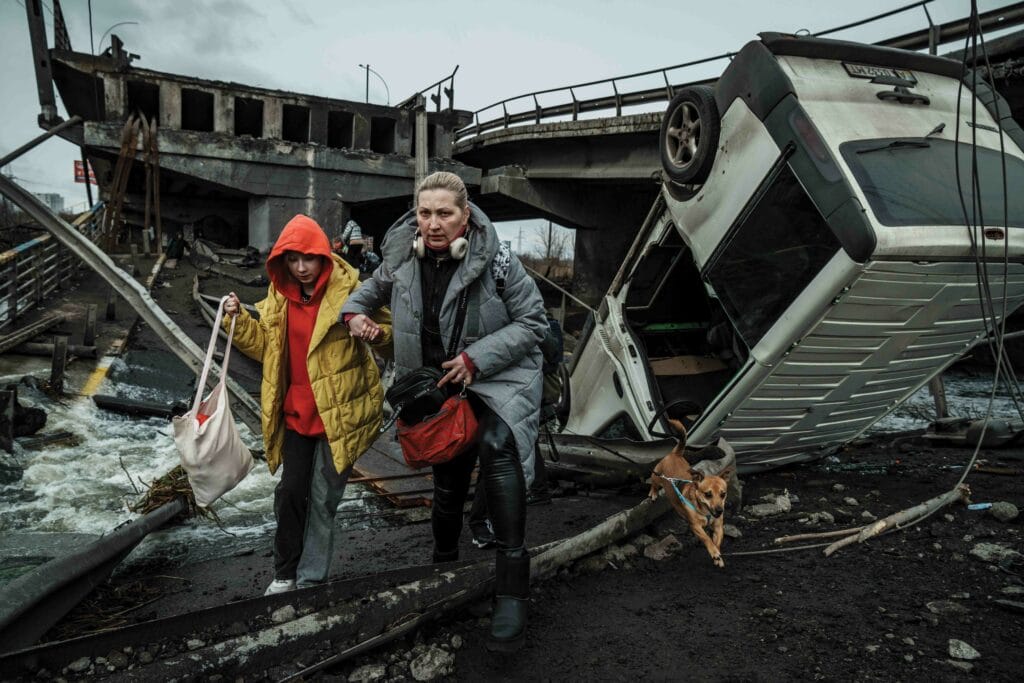
A woman with a child and their dog cross a makeshift walkway over a destroyed bridge during the evacuation from Irpin, 5th March 2022. Photo: Serhii Mykhalchuk/Global Images Ukraine via Getty Images
It was in the early hours of the morning that Olena phoned her daughter to warn her of the invasion. It was still dark outside. She was in a panic. “I told her to come quickly to us because the war had begun. And she replied: ‘Mum what are you talking about, some war?’ She couldn’t understand that what was happening was very serious.”
Both Irpin and Bucha were heavily attacked in the first days of the invasion. The speed of the assault took people by surprise. Residents, unsure what to do, hid in their basements. Many thought the war would be over in days, that it was just a scare tactic by Russia to intimidate Ukraine. But the fighting didn’t stop. People began running out of food. In some areas water and electricity was cut off after shelling damaged supply lines. The main bridge that connected Irpin and Bucha to Kyiv was blown up by Ukrainian forces in a desperate bid to hold back the Russian advance on the capital. The crossing point, once an artery for the towns’ residents commuting to their city jobs, crumpled into a treacherous, twisted hulk of metal and concrete. Escaping across it now meant a life-and-death dash under artillery fire, by foot. Desperate civilians took their chances, carrying family pets and pushing elderly relatives in wheelbarrows. Some didn’t make it to the other side.
Olena fled Irpin in the first few days of the war. But Karina wouldn’t leave Bucha, stubbornly convinced that the war would end quickly. Desperately worried about her daughter, who was trapped just a few miles away from her, Olena would call Karina several times a day and try to persuade her to leave. Finally, on 8th March Karina had decided that she had no choice but to flee Bucha. She told her mother that she’d heard an evacuation from the town was planned that day. She intended to join it. But when she arrived at the meeting point the crowd of desperate people far outnumbered the seats available in the waiting buses and cars. “There were too many people, she couldn’t make it,” says Olena, her eyes welling up with tears. Karina promised her mother that she was still searching for ways out and planned to leave as soon as she could. “On 10th March I spoke to her for the last time,” she says. After that Karina disappeared. Olena called and called. Six days went by with no answer. On the morning of 16th March Olena woke up convulsed with sobs. “I felt something here,” she says, clasping her hands to her heart.
The forest is eerily quiet. Two men dig in a hushed silence. Their clothes are muddy and drops of sweat form on their brows. It’s a grey, cloudy, late summer day. The air feels humid and filled with the threat of rain. The only sound is the occasional staccato burst of birdsong, coming from the canopy of towering pine trees, and the chink of shovels hitting the ground. A red-and-white crime scene tape flutters lightly in the breeze. Behind the cordon is a pile of fresh red-brown earth and a deep hole gouged from the green, leafy undergrowth. Numbered yellow markers are scattered across the forest floor – bright flashes of colour in the palette of earthy tones. Eventually, the two men heave a body from the earth. Once it’s wrapped in black plastic, they load it into the back of a waiting van. The doors slam shut.
No one thought they would attack the Kyiv region and just shoot civilians”
Andriiy Nebitov, head of police in the Kyiv region, has been quietly watching and waiting. The exhumation complete, he turns to address the small huddle of journalists standing at the roadside. He reminds them not to walk into the forest where demining is underway and then recites the known facts of the case to them from memory. “The body is of a man born in 1964 who died here. Together with his family he tried to leave on 28th February to a safe area. He was driving a Renault Trafic. Unfortunately, their car was shot by soldiers of the army of the Russian Federation. As a result, he, his wife and his 17-year-old son died. The grandmother and his five-year-old daughter, who was wounded in the head by a firearm, managed to escape.” The victim, he explains, had been identified by his clothing, but due to the body’s decomposed state, DNA testing would be carried out for confirmation. The man’s remains, he says, were discovered in the vicinity of a Russian military position – a different location from the rest of his family. “Recently we have been discovering a lot of bodies, precisely in places where the army of the Russian Federation was stationed, where they kidnapped people, tortured and then killed them.” The case, he says, will be filed along with more than 3,000 others in the Kyiv region under Article 438, the part of Ukraine’s Criminal Code that deals with war crimes.
Nebitov had been preparing his officers for the possibility of an attack for several months. Since the start of the year, Western officials had been vocal about intelligence that Russia planned to attack. Nebitov, who hails from Donetsk in the east of Ukraine, where Russian-backed separatist forces have been fighting Ukraine’s military since 2014, took the warnings seriously. Nevertheless, he admits that he had no comprehension of the scale or brutality of what was coming. “We had been preparing, of course, but still we were unprepared. I think it is impossible to prepare for war,” he says. “We thought there would be a provocation in the east of Ukraine, but no one thought they would attack the Kyiv region and just shoot civilians.”
On the night of the invasion Nebitov was at the police station, where he had been sleeping as a precautionary measure. “I believe I was among the first people in the country to be told the war had begun,” he tells me. It was around 4.30am. Around half an hour later, he heard the first explosions reverberate through the sleeping city, shaking its residents abruptly awake. “My life before and after 24th February, they are two completely different stories,” says Nebitov.
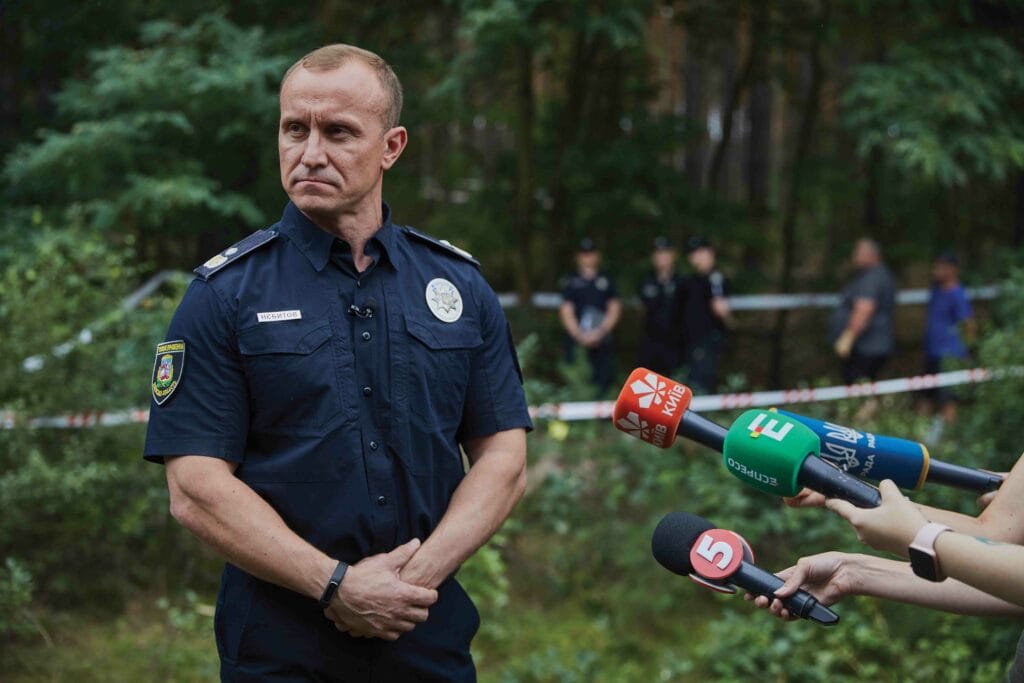
Andriiy Nebitov, head of Kyiv Police, at the scene of a crime perpetrated by Russian soldiers. Photo: Oleksandr Khomenko
In the first days of the invasion, Kyiv’s police worked to evacuate desperate people fleeing Bucha, Irpin and the dozens of other towns and small villages that lay in the advancing Russian army’s path to the capital. With the number of refugees outnumbering available seats in vehicles, Nebitov ran the gauntlet of artillery fire in his own car to rescue people from the conflict zone. There were several close calls. On one occasion, he learned that just after he had assisted in an evacuation of patients from Makariv hospital, the entire building had been levelled by an artillery strike. “If we had not managed to take these people out at this moment they probably would have died there,” he tells me.
Not everyone was so lucky. Some people were too elderly or too ill to flee the advancing army. Others, often the poorest, didn’t want to leave the homes they had spent their whole lives working to build. Many were simply paralysed with fear, unable to process the violence that had upended their lives and to find a way out before it was too late. One such person was Karina. For weeks Olena held on to a glimmer of hope that her daughter would show up in Kyiv. Perhaps she had left her phone behind in the rush, maybe her battery had run flat, and, in the chaos, she had been unable to charge it. Maybe she was safe but injured in a hospital somewhere. Perhaps she was still in Bucha, alive but with no phone connection. Olena asked everyone she could. She searched Kyiv’s shelters for displaced people. She filed a police report. “But no one knew anything, no one could give me any information,” she tells me.
Olena remembers the exact moment she got the call she’d been dreading. “It was 12th April at 11.30am,” she says. The police officer at the other end of the line asked her to come and identify Karina’s remains, which had been taken to Bila Tserkva, a city around 50 miles south of Kyiv. “Many bodies were brought there after they were exhumed in Bucha. We buried her there.” Olena’s husband had to hold her back from opening the coffin, he didn’t want her to see the marks of torture on Karina’s body or her face, half blown away by the bullet that killed her.

Women watch as bodies are exhumed from a mass grave to be inspected by the authorities investigating possible war crimes in Bucha, 8th April 2022. Photo: Laurel Chor/SOPA Images/LightRocket via Getty Images
Nebitov has a lean, athletic build, the result of his favourite stress-relieving pastime – running the streets of Kyiv. He’s a man who pays attention to both his physical and mental health. “When I have free time, I try to occupy myself with something to distract myself from the horrors I see every day. I love reading books and I love art.” The last few months, however, have taken a visible toll on him. His eyes are stern and ringed with dark circles.
Today, he says with a tired smile, is his 25th anniversary of joining the police – a length of service that qualifies him for retirement. “But clearly in this situation, I cannot imagine retiring,” he says with a glance towards the woodland grave. Since the start of the war, five of the police officers who served under him have been killed. Two died fighting in the east of the country after joining a battalion and another three were killed while carrying out evacuations. Many more have lost loved ones and their homes. One officer from Bucha, Nebitov tells me, lost his entire family when a shell hit their home: “The doctors tried to save the life of his little child but the next day he told me: ‘My baby also died.’”
On 1st April, Nebitov was among the first to enter the de-occupied territories, just hours after the Russian army had retreated. Although the soldiers had gone, hidden dangers lurked everywhere. Unexploded ordnance littered the streets and mines had been laid in roads near checkpoints set up by the invading forces. Improvised explosive devices had been rigged to household items, hidden in washing machines and strapped to chair legs. The slightest false move could be deadly. Nebitov and his investigators had to proceed with extreme caution as they attempted to understand what had taken place and to support traumatised civilians, many emerging from their basements for the first time in over a month.
During the occupation the police had received information about atrocities that were being committed in Bucha and the surrounding towns and villages, explains Nebitov. But what he witnessed when he arrived there was far worse than he could have imagined. “I find it difficult to find the words to describe what I saw,” he says. “There was no tarmac visible on the streets at all, everything was covered in broken glass, shell casings, broken equipment, burned cars, it was complete Armageddon. If you were to shoot a horror film, this would be it: mutilated fences, broken cars, people shot in cars. It was pure horror. Even the air was heavy, it felt like death. Where Russian military equipment was destroyed there were chunks of human flesh. The smell was terrible, like in a meat processing plant.”
Since that day, Nebitov and his team of police investigators have worked relentlessly to document what happened in these quiet countryside towns and villages during occupation. In every street they found a new tale of horror: the slumped bodies of five men, hands tied behind their backs in a torture chamber in the basement of a children’s holiday camp; a mass grave that contained the bodies of the family of the mayor of Motyzhyn – a village to the west of Kyiv – shot at point blank range. The list went on and on. “And this is just the Kyiv region,” Nebitov says. “In the areas where the occupation continues – Mariupol and Kherson – these horrors are still happening.” In the areas around Kharkiv, liberated by Ukrainian forces in September, there is evidence of more war crimes. In Izyum a mass grave containing 436 bodies has been dug up.
When Olena returned to Bucha there was still a large hole in the ground in the courtyard where Karina had been exhumed. People living nearby told her that when Russian soldiers brought Karina there she was still alive but badly injured – she had been shot in the leg. When an elderly couple tried to help her, one of the soldiers shot all three of them. The date, Olena learned, was 16th March – the day that she had woken up and felt the stabbing pain in her chest, like her heart was being broken in two. The bodies lay there for nearly a week before the old people’s terrified neighbours were able to sneak into the courtyard and bury them. Karina’s nails, which she always kept neatly manicured, were bloodied and ripped out. Olena fears that her daughter was sexually assaulted in the six missing days between her last phone call and her murder.
When I speak with Andriiy Nebitov it’s been nearly three months since the Russian soldiers retreated from Kyiv, but bodies are still being discovered. During the occupation of this region there were 1,352 confirmed deaths. This is Nebitov’s second exhumation this week. He expects more. “Unfortunately, we will continue to find bodies of civilians,” he tells me. “We still have people missing from the Kyiv region whom we continue to search for. There are about 300 of them.” Some, he says, are also likely to be somewhere out here in shallow woodland graves.
The true number of atrocities committed in Ukraine is not known. The Office of the Prosecutor has opened some 29,100 war crimes cases. But the real figure is believed to be much higher, and the war crimes committed in Bucha and Irpin are just the tip of the iceberg. Large swathes of the country are currently still occupied by Russia and are inaccessible to Ukrainian authorities.
We have to pierce the fog of war to get to the truth”
The scale and brutality of the violence against civilians in Ukraine, the worst in Europe since the bloody wars that surrounded Yugoslavia’s collapse in the 1990s and early 2000s, has attracted international condemnation. On 2nd March the International Criminal Court’s (ICC) top prosecutor, Karim Khan, announced that an investigation into atrocities committed in Ukraine had been opened following a referral by 39 member states – the largest number of countries to submit such a request to the court in its history. Since then, Khan has made three in-person visits to Ukraine, including to Bucha. “We’re here because we have reasonable grounds to believe that crimes within the jurisdiction of the ICC are being committed,” he told reporters on his most recent trip to war-torn Kharkiv. “We have to pierce the fog of war to get to the truth.”
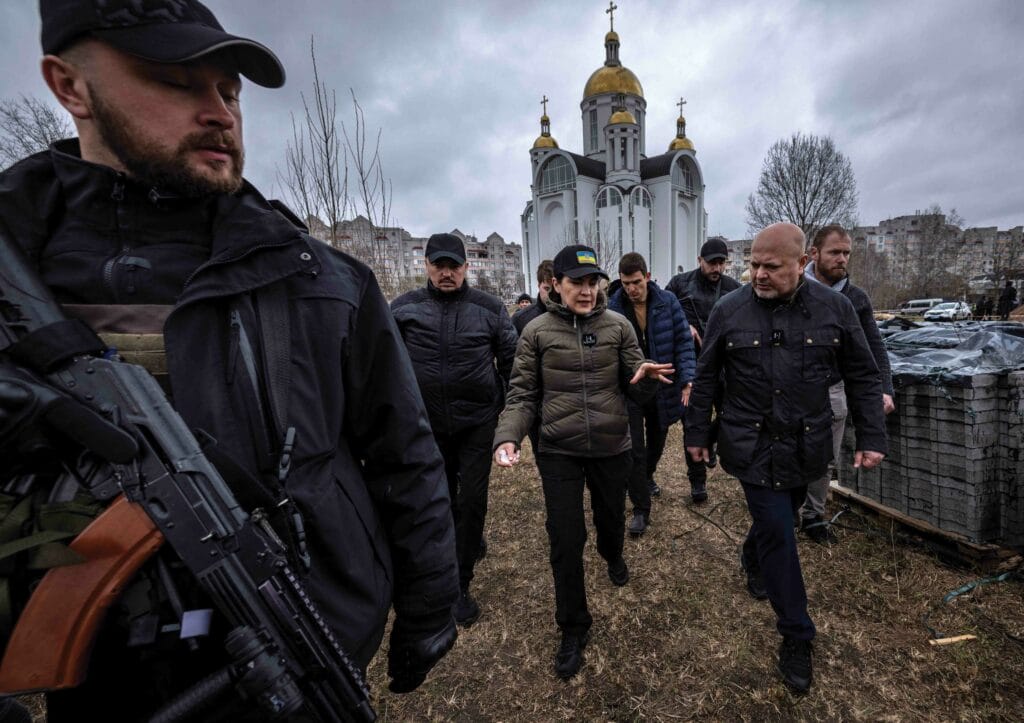
Ukraine’s former prosecutor general Iryna Venediktova (centre) and prosecutor of the International Criminal Court, Britain’s Karim Khan (right), visit a mass grave on the grounds of the Church of Saint Andrew in Bucha, 13th April 2022. Photo: Fadel Senna/AFP via Getty Images
Modern international criminal law traces its roots to the Nuremberg Tribunals. Held by the Allied Powers after they claimed victory in the Second World War, they were premised on the idea that some acts were so heinous that they were universally prohibited, even during times of war. Since then, other ad-hoc tribunals have been established to deliver justice for crimes committed during specific conflicts including the International Criminal Tribunal for the former Yugoslavia in 1993, the International Criminal Tribunal for Rwanda in 1994 and the Special Court for Sierra Leone in 2002. The ICC, however, established in 2000 by way of the Rome Statute, is the first, and only, permanent international court with the remit to prosecute individuals for serious violations of international criminal law, namely: genocide, war crimes and crimes against humanity.
“Ukraine is a high-profile situation for the ICC,” says Wayne Jordash, managing partner at Global Rights Compliance (GRC), a not-for-profit specialised in international humanitarian and criminal law. Nevertheless, he warns, the wheels of justice at the Hague-based court turn “incredibly slowly” – in the 20 years since the ICC began operations it has secured just ten convictions. In practice, Jordash explains, the Court is likely to focus its resources on building a handful of select cases against high-ranking Russian officials including Putin, who as a serving head of state has immunity before national courts. It’s a process, he says, that could take years if not decades. “There’s a really fevered expectation about the ICC prosecution, but I think it’s important to keep it in perspective. There’s been a lot of noise but not much has yet happened.”
Jordash, who has more than two decades of experience as a lawyer prosecuting atrocities and human-rights violations, has worked as a legal advisor on conflict-related crimes in Ukraine since 2015. Four years ago, he moved full time to Kyiv after meeting his now-wife. “Ukraine is my adopted home, my wife’s family is from here, it’s personal, I feel duty bound to help in whatever way I can,” he tells me. “Before 24th February I worked on multiple projects, including Ukraine – now 95 percent of my work is Ukraine.” Given the ICC’s tendency to focus on more senior officials, Jordash and GRC are focused on building Ukraine’s capacity to prosecute war crimes in its own courts, including by setting up ‘mobile justice teams’ – experts with specialties in law, forensics and open-source intelligence who can be quickly deployed to work on a crime scene. But while the organisation has already trained scores of investigators and prosecutors, Jordash warns that this is a drop in the ocean compared to what is required.
The whole country needs to be viewed as a massive crime scene”
“Ukraine needs hundreds, even thousands of people to be working on these cases,” he tells me. “The crimes that end up being prosecuted at the ICC will barely make a dent in the huge number of crimes that have been committed. The reality is that most will need to be investigated by Ukrainian investigators and tried in Ukrainian courts.” Moreover, the ICC is a court of last resort. Its founding charter, the Rome Statute, permits it to prosecute crimes only if domestic courts cannot – in conflict and post-conflict countries broken judicial systems and political sensitivities often make holding war crimes trials difficult. That is not the case in Ukraine, Jordash argues. “Ukraine has a functioning prosecution service. They’re willing to do it. And I think in large part they’re able to do it. So… as much as is possible, most people should be investigated and hopefully, in due course, tried in Ukraine.”
Nonetheless, it’s a mammoth undertaking for Ukraine’s criminal justice system. Investigating war crimes requires a highly specialised skillset. Anya Neistat, legal director of the Clooney Foundation for Justice (CFJ) has spent much of the summer sifting through rubble in search of munitions remnants and interviewing eyewitnesses and survivors of war crimes across Ukraine. “The whole country needs to be viewed as a massive crime scene,” she tells me.
It’s not Neistat’s first time working in the middle of a conflict. A Havard-educated lawyer, she has spent most of her career documenting atrocities and human-rights violations in conflict zones across the world. She donned a niqab to sneak across the Syrian border and investigate attacks by government forces against civilians. In Georgia, she was detained while investigating atrocities committed by Russian-backed militias. In Lebanon, she investigated underground networks trading in looted conflict antiquities.
Working in Ukraine, however, is challenging for Neistat on a personal level. “It’s just so close to home,” she says. Neistat left Russia, her birthplace, for New York 14 years ago. “I’ve documented crimes committed by the Russian Federation in Chechnya, in Georgia, in Syria, in Ukraine in 2014…. You can say it’s my life’s work. But it’s been some years since I worked in a language I understand, Russian or Ukrainian. It feels very different when there’s no translator, no buffer, between you and the person you are interviewing. All their suffering pours straight into your brain. But I think the attitude of the international community towards the Russian Federation has changed in the last 20 years. I feel that we are closer to holding them to account than ever before and that motivates me to keep documenting these crimes.”
Knowing that war crimes have been committed and taking someone to court for it are, however, two different things. “Some crimes like executions or torture are much easier to establish because there is no defence for doing it, it’s totally prohibited so there is no question about it,” she says. Investigations of these types of crime are more akin to ‘regular’ crimes, such as murder and rape committed outside of war. “So long as you can identify the perpetrator it’s a relatively straightforward case,” says Neistat.
Other crimes, however, are more complex to prove. Holding higher-ranking officials, military or political, to account requires connecting a person that planned an atrocity to the event, even if they were physically remote from it or did not commit it with their own hand. This so-called ‘linkage’ evidence has traditionally taken the form of ‘insiders’ who can provide information on command structure and orders given. Increasingly, however, open-source intelligence (OSINT) – ranging from satellite images of troop positions to intercepted radio comms and videos and images taken on mobile phones – is taking its place. But while OSINT can provide valuable insights into the ‘black box’ of military strategy, the volume of material can present its own challenges. “There’s much, much more OSINT than was coming out of Syria ten years ago,” says Neistat. “This conflict is pretty much happening online in real-time. Citizens are very actively collecting information on their cell phones. The amount of information is overwhelming. There’s important evidence there, but you have to sift through this vast, vast amount of data to find what is useful, then it has to be geolocated and verified and so on.”
Among the cases that Neistat is working on is the shelling of a mall in Kremenchuk in central Ukraine. Hit on 27th June during the middle of the day, the shopping complex was crowded with people – 24 civilians were killed and 200 more injured, 89 seriously. “Indiscriminate attacks have very high casualty rates, you can have tens or even hundreds of people killed, so it’s a very high impact crime, but legally speaking it’s one of the most challenging to prove,” she says. On the face of it these look like wanton attacks on civilians designed to instil terror, she explains, but the laws of armed conflict are more nuanced. In some circumstances, striking a building used by civilians can be permitted. For example, if armed forces are also using the location, it can become a ‘military object’ which is a legitimate target. Other factors that must be considered are whether the attack can be deemed a ‘military necessity’, whether steps were taken to minimise civilian casualties and indeed whether it was the intended target at all.
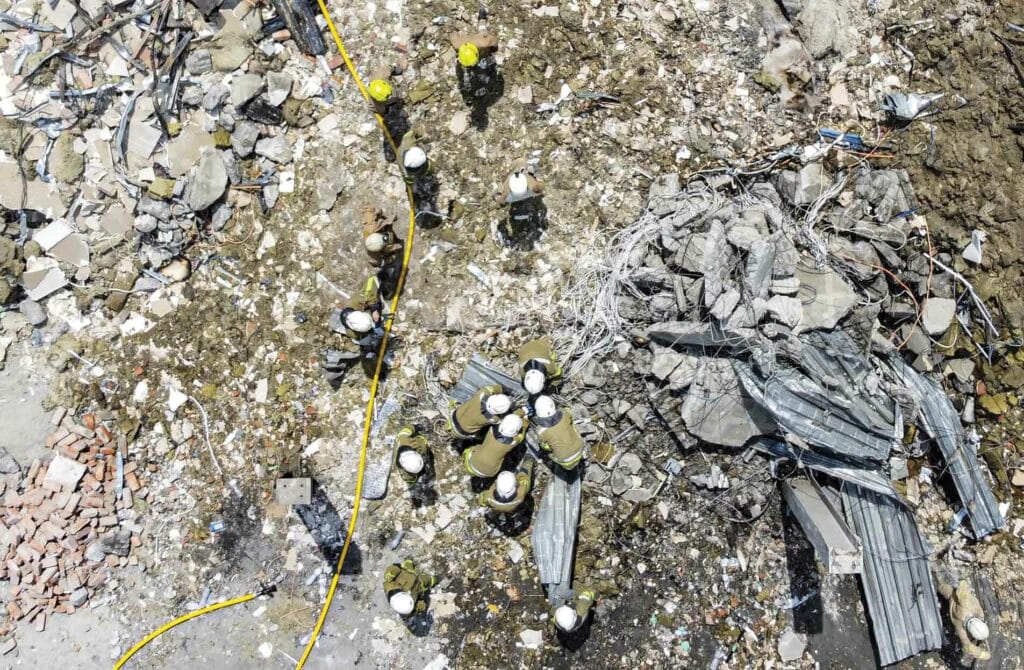
An aerial view of debris removal works at a destroyed shopping mall targeted by a Russian missile strike in Kremenchuk, Ukraine, 29th June 2022. Photo: Metin Aktas/Anadolu Agency via Getty Images
“You have to really unpack it,” says Neistat. “The Russians immediately claimed that they hit the shopping mall because of a military meeting taking place nearby. That’s not to say that they are telling the truth. But it’s important to investigate such claims from the very beginning, because if this case ever goes to court you can’t just dismiss their arguments, you have to be able to address and counter them to prove that this was not the case.”
This view is echoed by Yuriy Belousov, head of Ukraine’s war crimes prosecution department. “Unfortunately, there’s a difference between morally wrong and legally wrong,” he tells me. “This is a very difficult thing to tell a relative of someone who has been killed fighting.” Belousov is dressed from head to toe in black, with a calm demeanour and kind brown eyes. As we speak his phone buzzes constantly with messages and incoming calls. His experience working in the international legal sphere is now very much in demand – before he was appointed to his current job in May, Belousov specialised in investigating human-rights abuse cases involving torture.
“There are many, many challenges for us, we have learned a lot about how to prosecute war crimes, but we have a lot more to do,” he tells me. At the regional level, Belousov explains, police officers and prosecutors who are not accustomed to working in an international legal framework have been thrust into the role of war crimes investigators. To address this, he has set up national level task forces to work on more complex crimes such as forced deportation of Ukrainian citizens from occupied territories to Russia and indiscriminate attacks. “For this type of crime, you need a helicopter view of the situation. We’re talking about thousands and thousands of Ukrainians. You can’t view each deportation as an individual crime, you need to look at the system that has been used to carry out this crime.”
I understand that you will not be able to forgive me. But I am asking your forgiveness”
But by far the biggest issue faced by investigators, Belousov explains, is the war itself. Russia is currently occupying around 20 percent of Ukraine’s territory and some 6.9 million people have fled the country. “We just don’t have physical access to a crime scene,” he says. “We don’t have physical access to witnesses. We don’t have physical access to victims. And that’s the number one problem.”
Other factors have played in investigators’ favour. Russia’s rapid retreat from the territories around Kyiv and the large number of Russian soldiers captured by Ukrainian forces have enabled speedy prosecutions in some cases.“We screen every prisoner of war and if it emerges someone has been involved in a crime, we will progress with this case, because if the accused is here in Ukraine, we can conduct the investigation much more quickly – they are present to defend themselves against the allegations. These screenings have produced our first verdicts,” says Belousov.
On 23rd May, Vadim Shishmarin, a squad commander in the 4th Guards Kantemirovskaya Tank Division of the Russian military became the first person to be convicted of war crimes committed in Ukraine. For much of the trial, held in a court in Kyiv, the young man hung his head and kept his eyes fixed firmly on the floor. The 21-year-old from Siberia had joined the Russian army as a contract soldier just months before being captured as a prisoner of war. In interviews with Ukraine’s security service, he admitted to shooting a pensioner who had done nothing other than being in the wrong place at the wrong time – 62-year-old Oleksandr Shelipov was talking on his phone and pushing his bike down the street when Shishmarin shot him. In court Shishmarin confirmed his guilt in his address to Shelipov’s widow. “I understand that you will not be able to forgive me,” he said. “But I am asking your forgiveness.”
Shishmarin’s case speaks to the tragedy of the war in Ukraine. A young soldier who cannot take back his murderous act. A woman whose husband’s life was needlessly taken away. It is also significant because it has been adjudicated within weeks of the Russian invasion starting. War crimes typically take years, if not decades, to prosecute and it is extremely rare for them to take place amid an ongoing conflict. Indeed, some international law experts have claimed that the speed at which prosecutions are taking place indicates a lack of due process – since Shishmarin was convicted, another eight guilty verdicts have been delivered for war crimes charges, mostly against soldiers captured by Ukraine.
Among those who have cautioned against passing judgements too quickly is Gyunduz Mamedov, Ukraine’s former deputy prosecutor, who established the country’s specialised War Crimes Unit in 2019. “We have to be cautious of society’s demands for quick justice,” he tells me. Mamedov, who now heads the Ukraine 5am Coalition, an NGO that collects evidence of atrocities, has also called on Ukrainian president Volodymyr Zelensky to enact a law known as Bill 2689 that was passed by the country’s parliament in 2021. The bill would simplify and update domestic legislation used to prosecute war crimes and crimes against humanity. Doing so, Mamedov explains, would mean lawyers no longer had to refer to multiple, complex international treaties – “I counted and there are around 30 treaties from the 19th century that have to be considered,” he says. “Right now, there should be a focus on delivering justice without violating rights, including the rights of suspects.”
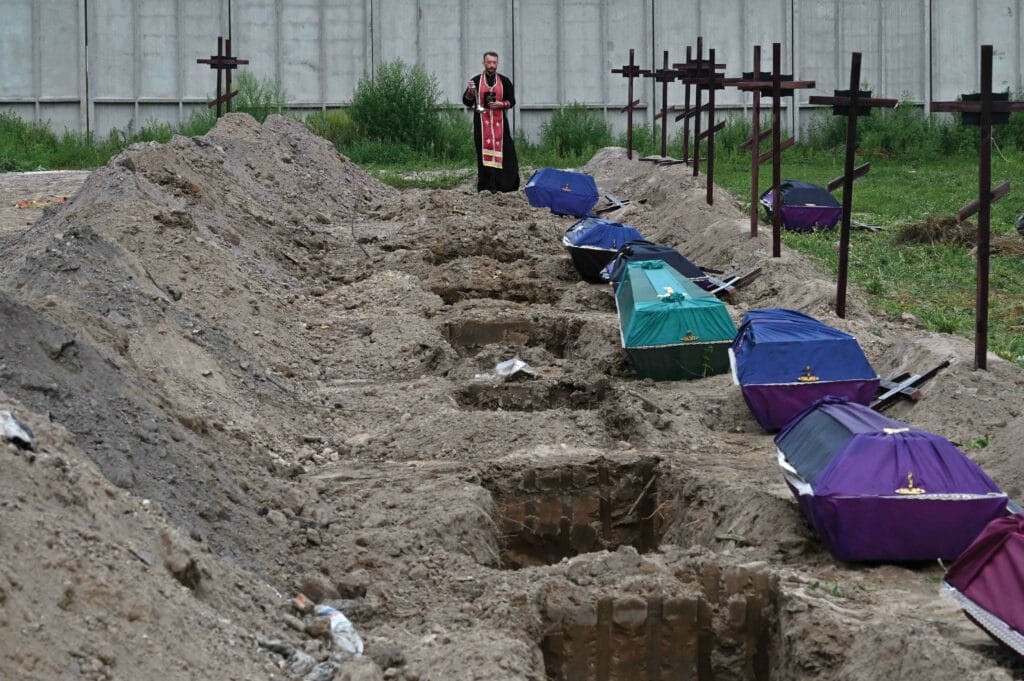
Orthodox priest Andriy Golovin recites a prayer at the graves of unidentified civilians during their funeral at a cemetery in Bucha on 11th August 2022. Photo: Sergei Supinsky/AFP via Getty Images
When it comes to the speed at which trials are held, however, slower isn’t always better. “It’s a catch-22,” says British lawyer Jordash, who has been involved in reviewing the trials and verdicts on behalf of the Atrocity Crime Advisory Group, a multilateral initiative between the US, UK and EU. “You can’t have it both ways. You can’t say it’s an international obligation to hold trials and that those trials have to be expeditious and then criticise Ukraine for doing exactly that,” he tells me. “From what I’ve seen of the prosecution they’ve been very careful to ensure fair trials and there’s not a culture of vengeance.” A case in point, he says, is Shishmarin’s sentence, criticised by some international lawyers for being too severe and reduced from life to 15 years by the court of appeal.
In stark contrast, war crimes trials held in the so-called ‘Donetsk People’s Republic’ – an unrecognised Russian-backed pseudo-state in Ukraine’s east – have been internationally condemned both for violating the rights of the accused and for excessively harsh sentencing. On 7th June a court in the rebel-controlled territory sentenced three men – two Britons and a Moroccan – to death for fighting as ‘mercenaries’ in Ukraine. The UK’s then-foreign secretary Liz Truss called the verdict a “sham judgement with absolutely no legitimacy.” Ukrainian authorities have said that the men were part of Ukraine’s armed forces, not mercenaries, and as such they are entitled to combatant privileges. The men were released as part of a Saudi-brokered prisoner exchange between Russia and Ukraine on 21st September.
Belousov believes that holding fair trials is crucial to maintaining Ukraine’s moral integrity. “The law is on our side and that is what makes us different from them,” he says. “We want to deliver justice, not just take revenge. Sometimes you have to catch yourself. I mean we [prosecutors and police] are humans, we have families, mothers, sons, wives, daughters, and we are dealing with cases of rape and torture – cruel crimes, really horrific things. But you have to focus on doing the job and doing it fairly.”
The question of guilt or innocence is not just a legal matter, however. Nadia Volchenska has worked for 12 years as a psychologist specialising in supporting survivors of trauma. “If a person really wants a trial, then for them it is of course a matter of justice to see someone punished for the crime, at least in the language of the law,” she tells me. But even more important for a survivor’s psychological recovery than legally establishing a perpetrator’s guilt is the survivor’s own belief that: “She is innocent. That she is the victim of a crime. That she deserves sympathy. That she lives on. This is healing.”
Volchenska has long curly auburn hair and a quiet confidence in her voice. Her work is not easy. “It stays with you,” she admits. “But when you see that a person, after three or five meetings, that some of her burden has lifted, that she can talk more freely or even smile, when it seemed to her before that she would never smile again, then that makes it worthwhile.” Volchenska first heard reports of sexual assaults in territories under Russian occupation just days into the war. She immediately began fundraising to provide professional support for survivors. By March she had established Sylni, an NGO that provides therapeutic, legal and medical support to victims of sexual violence.
Volchenska’s organisation is currently providing counselling to several women. Many more have made contact but are not ready to begin working through the trauma. Currently Ukraine is investigating scores of rapes committed during the occupation of the Kyiv regions and two Russian soldiers have already been convicted for raping a woman and murdering her husband. This conviction has motivated other women to consider telling their story to authorities. “They saw an example of how something can be changed. They can get confirmation that this is a crime and have the criminal punished,” says Volchenka. Sylni reminds all those who make contact that under the Geneva Conventions sexual violence during war is a war crime and has no statute of limitations. So even if a person is not ready to make a report now, says Volchenka, they can change their mind and do so in the future.
In Bucha and Irpin volunteer groups have worked hard to clear up the visible signs of the devastation”
Rape, she explains, is most common not during periods of active fighting but in occupied territories. “People go crazy with power, and they want to express that power,” she says. The risk of sexual violence also increases if that grip on control begins to weaken. As well as Bucha and Irpin, Volchenska says that several women from Kherson – a city in the south which Ukrainian armed forces have launched a counter-offensive to take back from Russian control – have called Sylni’s hotline. “We understand that sexual violence is a systemic problem in this conflict, and we expect there will be many more people to support after Kherson’s liberation,” she tells me.
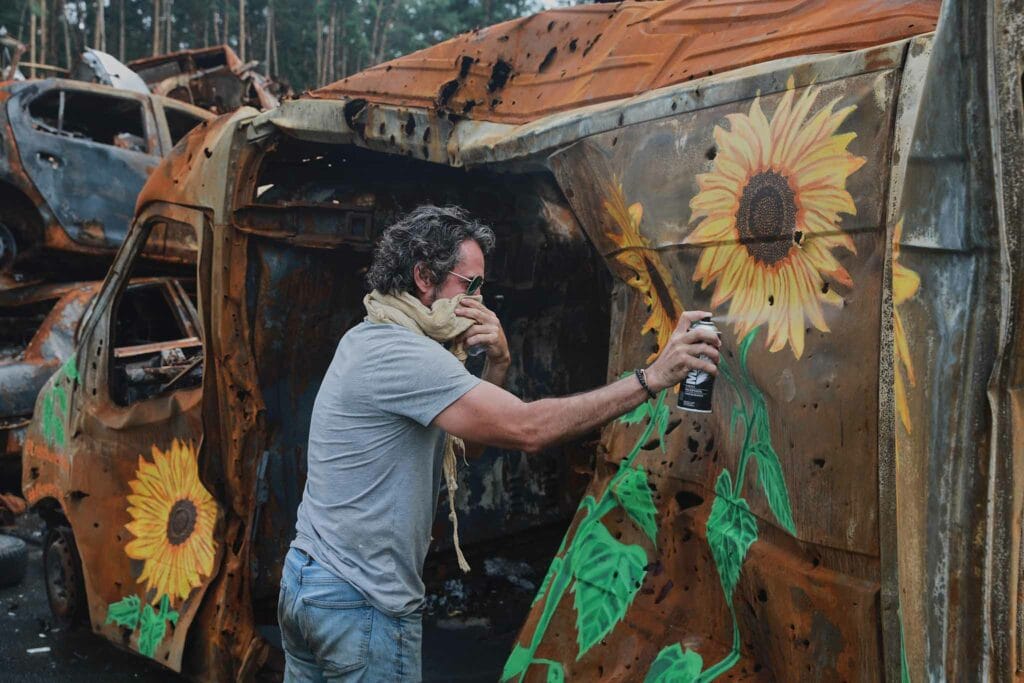
An artist spraypaints sunflowers, a symbol of Ukraine, on a burnt-out, bullet-riddled van. Photo: Oleksandr Khomenko
Victims of wartime sexual violence face huge challenges, Volchenska explains. “When we talk about sexual abuse in ordinary times, survivors have something stable that existed before and after the abuse,” she says. “She has some stable background. She has a relationship. She has a job. It can even just be a coffee shop where she drank before. This coffee shop remains. This is constant. It remains from life before and these stable factors can help return to a normal life. When there is war, sexual violence is never the only problem in that person’s life. The background in general is not stable, it has already been changed, many terrible things have happened: death, loss of territory, loss of security in general. Security is lost not individually, in the personal experience of sexual violence, but at the level of the country, at the level of society.”
In Bucha and Irpin volunteer groups have worked hard to clear up the visible signs of the devastation left behind in the wake of Russian soldiers. Glass has been swept away, windows boarded up, damaged roofs repaired and shops reopened. Artists have spray painted sunflowers – a symbol of Ukraine – on burnt-out cars retrieved from the roadside. Some are riddled with bullet holes, their passengers’ fate unknown. “What we see here now, let’s just say it’s beauty,” says Nebitov, comparing it to horrors he encountered the first time entered Bucha after the occupation. On 1st September children in Bucha returned to the classroom for the first day of the school year – a sign that for some a modicum of normality is slowly returning.
But for those who have lost their loved ones forever there can be no return to life before Russia’s invasion. For Olena there is no way to repair her broken heart. There are still no suspects in Karina’s case and Olena has denied requests for her body to be exhumed, once again, for further forensic examination. “And if they find the soldier who shot her and the old people and say: ‘Yes, he is guilty’. Then what? They [Russians] are all guilty – not only those with weapons in their hands,” she says. “For me there can be no justice.”
Slow Journalism in your inbox, plus infographics, offers and more: sign up for the free DG newsletter. Sign me up
Thanks for signing up.

